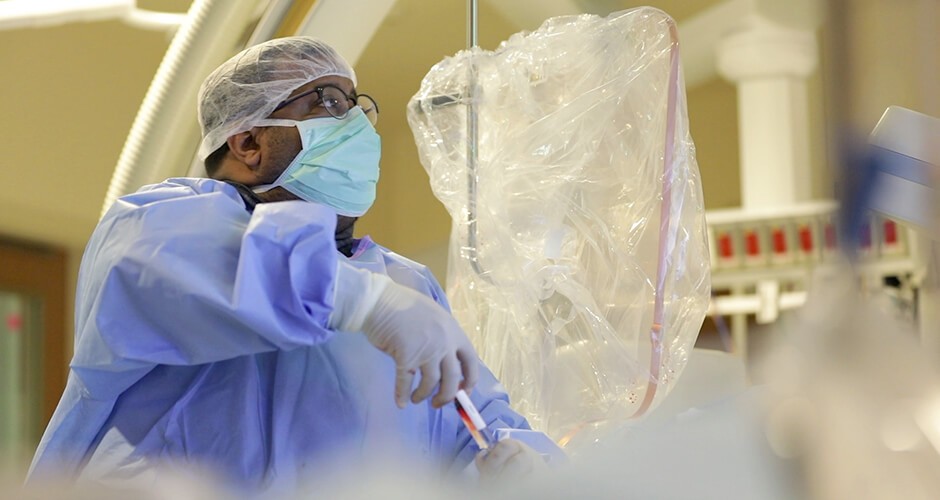During the pandemic, providers are seeing more strokes in individuals who are suffering from COVID-19.
There is no clear evidence that would confirm COVID-19 causes strokes, but physicians are recognizing that otherwise healthy patients are suffering strokes and also testing positive for the virus.
To review, a stroke happens when blood flow to the brain stops abruptly due to a blood clot, causing an ischemic type of stroke. It can also happen when a blood vessel ruptures, causing a hemorrhagic type of stroke.
Stroke symptoms come suddenly, and the deficits can be disabling and irreversible. Acting FAST and seeking immediate medical attention could give one a good chance of reversing neurological deficits and having improved outcome.
FAST is an acronym to help you remember stroke symptoms: facial drooping, arm weakness, speech difficulties and time. It has been used by the National Stroke Association, American Heart Association and others to identify stroke symptoms.
Originally it was believed COVID-19 was related to the respiratory system but we know now the disease’s borders go well beyond that. In truth, the virus can affect many organs in the body, including the brain.
“The virus can cause inflammation in many parts of the body and push the body into a hyper coagulable state,” said Dr. Alexander Drofa, a neurosurgeon at Sanford Health in Fargo, North Dakota.
“In simple terms, it means a higher tendency to form blood clots. That’s where the correlation is. Microthrombi, or small blood clots, can form in blood vessels which are going all over the body, including the brain, and causing ischemic stroke by obstructing blood flow to the brain vessels.”
Strokes more likely with COVID-19
Viruses in general can make blood clots more likely, which can then accelerate the potential for a stroke. COVID-19 appears to increase this rate beyond that of influenza, though physicians need more research to confirm findings.
In one small study published by the Journal of American Medicine in July, 1.6% of COVID-19 patients suffered ischemic strokes. That rate was 7.6 times higher than strokes occurring in patients with influenza.
“People in younger age groups are presenting with stroke-like symptoms without any risk factors and on additional studies are testing positive for COVID-19,” Dr. Drofa says. “There have been case reports from all over the globe. It can affect any age group, and even minor neurological symptoms in any age group should not be ignored. It is important to seek medical attention immediately in those instances, regardless of age.”
Typical early symptoms of COVID-19 are cough, fever, shortness of breath and fatigue. In addition, common neurological symptoms are:
- Headache
- Dizziness
- Loss of smell
- Inability to taste
- Muscle weakness
- Numbness and tingling in the hands and feet
- Confusion
- Delirium
- Seizures
- Stroke
Seek immediate treatment
“Beyond the fatigue, long-term neurological effects of the virus are being reported,” Dr. Drofa says. “Neuropsychological issues including mental slowness, mood disorders, cognitive impairment, as well as chronic headache and lingering loss of taste or smell sensation are being reported. Some researchers are calling it COVID-fog.
“There’s not a good answer yet on how long these symptoms are going to linger,” Dr. Sachdeva adds. “Are they all going to go away in a certain amount of time? This is what we are still learning about the disease. It’s a work in progress.”
So what can you do if you’re dealing with lingering effects of the coronavirus?
“My advice to all the patients who are bravely dealing with the virus is to stay in constant touch with their primary care physicians,” Dr. Drofa says. “If there is anything out of the ordinary, don’t ignore the symptoms and seek medical attention.”
Screenings for cancer, heart disease and stroke are down nationwide while people stay home during the pandemic. The response from Sanford Health has been uniform on that count: Continue to maintain preventive care measures and when not feeling well, contact your primary care provider.
“I understand the hesitation if you are quarantining at home or you’re trying to avoid public interaction, but you have to remember stroke symptoms can be devastating,” Dr. Drofa says. “They can be long-lasting and irreversible. Do not sit on it. If you’re experiencing acute stroke symptoms, act FAST and dial 911. I assure you we are taking all precautions and following all the COVID-19 protocols so you are safe, but you need to be treated.”
The Good Samaritan Society is affiliated with Sanford Health. Merging in 2019, Sanford Health and The Evangelical Lutheran Good Samaritan Society now serve people in over half the United States.
Our therapy programs help you thrive
Information in this article was accurate when it was posted. As the COVID-19 pandemic continues, scientific understanding and guidelines may have changed since the original publication date. Read more about the COVID-19 vaccines.



